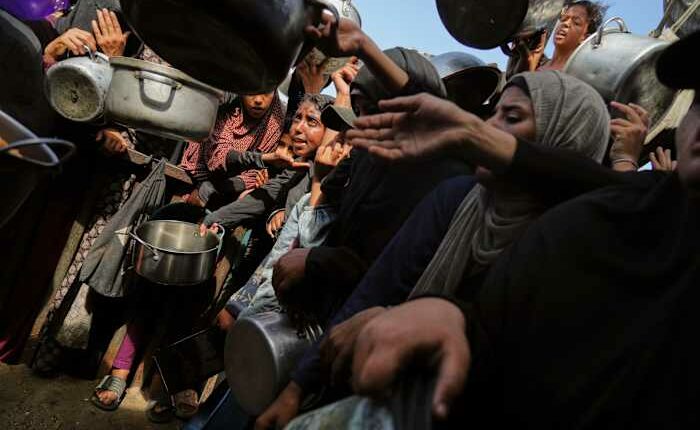Share this @internewscast.com

TANZANIA – The United Nations announced Thursday that a substantial 170,000 metric tons of food, medicine, and essential humanitarian aid is poised for delivery into Gaza. They are currently awaiting approval from Israel to significantly amplify assistance for over 2 million Palestinians, following an agreement to temporarily halt the conflict.
Over the past few months, the U.N. and its partners in humanitarian efforts have only managed to provide 20% of the necessary aid to relieve the grave conditions in the Gaza Strip, according to U.N. humanitarian chief Tom Fletcher. After the recent announcement of a ceasefire, Fletcher emphasized the need for all access points into Gaza to be opened to allow for a “much, much greater scale” of aid distribution.
“Considering the high level of needs, starvation, and overwhelming misery and despair, a massive joint effort is required, and for that, we are fully prepared and mobilized,” Fletcher stated. “We are completely ready to enhance our delivery efforts.”
The agreement revealed on Wednesday by President Donald Trump signifies the first time in several months that U.N. officials feel optimistic about increasing aid distribution. The enduring conflict, along with escalated Israeli military actions and limits on aid, has caused a severe hunger crisis, leading to famine in several areas of the region.
The conflict, initiated by the Hamas attack on Israel on October 7, 2023, which resulted in 1,200 casualties, has devastated Gaza, caused the deaths of tens of thousands of Palestinians, ignited other regional conflicts, and resulted in Israel’s isolation on the global stage, especially at the U.N.
UN hopes to bring more aid to Gaza soon
Addressing U.N. reporters virtually from Riyadh, Saudi Arabia’s capital, Fletcher expressed that the U.N. has been “requesting, urging, and pleading for access, which we anticipate will be granted in the upcoming days.”
Israel accused Hamas of siphoning off aid — without providing evidence of widespread diversion — and blamed U.N. agencies for failing to deliver food it has allowed into Gaza. It replaced the U.N. aid operation in Gaza in May with an Israeli- and U.S.-backed contractor, the Gaza Humanitarian Foundation, as the primary food supplier.
U.N. spokesman Stephane Dujarric said Thursday that he was not aware of any role for GHF during the ceasefire.
Fletcher said the U.N. is being guided by the 20-point ceasefire plan put forward by the United States, which stresses “the importance of the U.N. role at the heart of the humanitarian response.”
These are the UN’s priorities during the ceasefire
In the first 60 days of the ceasefire, Fletcher said, the U.N. would aim to increase the number of trucks with aid entering Gaza to between 500 and 600 daily as well as scale up food deliveries to 2.1 million people and 500,000 who need nutritional supplements.
“Famine must be reversed in areas where it has taken hold and prevented in others,” he said, adding that special rations for those facing acute hunger would be distributed, and bakeries and community kitchens would be supported.
Fletcher said the U.N. aims to deliver medicine and supplies to restore Gaza’s decimated health system; to scale up emergency and primary health care, including mental health and rehabilitation services; to support medical referrals and medical evacuations; and to deploy more emergency teams.
The U.N. also aims to restore Gaza’s water grid and improve sanitation by installing latrines in households, repairing sewage leaks and pumping stations, and moving solid waste from residential areas, he said.
Ahead of winter and with most housing destroyed, Fletcher said, the United Nations also is planning to bring in thousands of tents every week in addition to heavy-duty waterproof tarpaulins.
As for education, he said, the U.N. plans to reopen temporary learning spaces for 700,000 school-age children and “provide them with learning materials and school supplies.”
Fletcher said the U.N. can deliver this plan as it has done before, but it needs to ensure protection for civilians, especially women and girls who have been victims of sexual violence, and to identify where unexploded ordnance is to reduce the risk of deaths and injuries.
It also needs Israel to allow the entry of the U.N.’s partners from humanitarian and other organizations, and it needs money — lots of it.
Fletcher warned that the 170,000 tons of aid ready to enter Gaza is just the tip of the iceberg for what is needed, and he called on developed countries to scale up contributions to the aid effort.
“Every government, every state, every individual who has been watching this crisis unfold and wondering, ‘What can we do? If only there is something we can do.’ Now is the time to make that generosity count,” he said.
Copyright 2025 The Associated Press. All rights reserved. This material may not be published, broadcast, rewritten or redistributed without permission.











